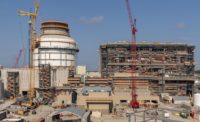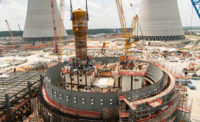The U.S. Nuclear Regulatory Commission has launched a “special inspection” to determine reasons behind needed construction remediation work of installed electrical systems at the Southern Nuclear Co. Vogtle Unit 3 construction project in Georgia and the utility’s overall quality assurance processes.
The NRC effort was initiated on June 21 after it discovered the remediation activity for those systems.
Specifically, NRC inspectors will focus on the electrical cable raceway system, which consists of “conduits and cable trays designed to route and support the cables needed to ensure safety-related equipment is powered to perform its safety functions,” according to the federal agency.
The broader review will look into Southern's “root cause investigation, corrective actions, construction quality assurance process and any potential implications for Unit 4,” NRC said.
NRC spokesperson Dave Gasperson told ENR that a special inspection is “the lowest level of our ‘reactive’ inspections. We conduct a special inspection when something out of the ordinary and significant occurs where the agency wants to ensure there’s a full understanding of the issue.”
The utility had previously identified the electrical cable raceway to the NRC as needing to be re-examined, he added. “We’re going to review how Southern’s handling that, and how the company will apply what it learned to the Unit 4 construction.”
Questions Over QA
Testimony jointly submitted earlier this month by the Georgia Public Service Commission official Steven Roetger and independent construction monitor William Jacobs addressed the state regulatory agency's questions about Southern's oversight of the Vogtle quality-assurance program. The monitors noted that on several occasions, project personnel failed to initiate a "condition report" when unexpected events occurred during recent systems testing.
In late 2019, when testing two condensate system pumps, project personnel "heard a loud bang, there was noticeable pipe movement and the Turbine Building shook," they said. Despite that, Roetger and Jacobs' testimony noted that "none of the personnel present at the time initiated a Condition Report." Later, two pipe supports were found to have been damaged by the test.
Roetger and Jacobs noted that, historically, Southern's role "has been, to varying degrees, one of oversight of their contractors’ [quality-assurance programs],” rather than managing these programs directly. That approach failed to yield good results early on in the project, as monitors commented regarding Vogtle’s earlier contractors, that “it was apparent that neither Stone & Webster nor Westinghouse Electric Co. were capable of executing their respective programs.”
Adding to that problem was the fact that Southern also “did not have adequate processes in place to maintain reasonable assurance that quality work was being performed,” say monitors, with the result that “first-time quality severely suffered.” That remains a problem, as monitors recently said the need for construction remediation work continues to hamper project progress.
Southern’s decision to monitor quality assurance programs being managed by other groups goes against NRC requirements that a licensee “shall retain responsibility” of such programs. Said Roetger and Jacobs: “In other words, NRC does not allow the abrogation of responsibility for the [progam] simply because the contractual agreement between the Licensee and its contractors states so.”
Commenting on the NRC’s special inspection, utility spokesman Jeffrey Wilson told ENR: “Southern Nuclear welcomes NRC’s inspection of its construction activities and will be engaged in NRC’s inspection process.”
The federal agency expects inspectors to complete their work in a “couple of weeks."





Post a comment to this article
Report Abusive Comment